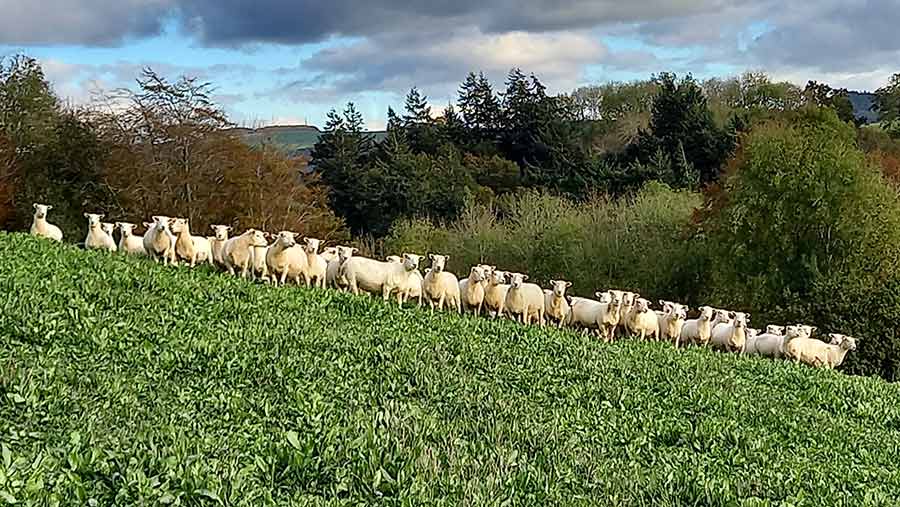New red clover trial reveals positive effects on ewe fertility
 © Gillian Preece
© Gillian Preece Red clover has no adverse effect on ewe fertility when used in mixed swards, on-farm research has shown.
The Innovative Farmers field lab showed grazing ewes on herbal leys containing red clover can even have a positive effect on pregnancy rates.
Previous research from Australia and New Zealand dating back 50 years found fertility could be affected when ewes were grazed exclusively on red clover. The problem was caused by the legume’s phyto-oestrogen content.
See also: How to get the best from red clover in grassland
By contrast, when a group of farmers in the West Midlands and Powys grazed their sheep on herbal leys with an average red clover content of 17.6%, scanning rates improved.
“A lot of farmers are hesitant about giving [red clover] a go, but the original research was done so long ago and with ewes grazing pure red clover, which is not how we use it,” says Marc Jones, one of the four farmers involved in the field lab.
Mr Jones has been putting ewes on leys containing red clover for six or seven years without any negative effects. He wanted to gather some evidence to back up his experience.
Trial of two halves
The field lab involved selecting a group of ewes for the trial and splitting them into two halves. One half was grazed on grass leys with no red clover, and the other on herbal leys containing the legume.
Both were grazed for three weeks before tupping and throughout the mating season. They were then scanned for pregnancy.
On average, the ewes in the control group scanned at 170%, while the ewes mated on swards containing red clover scanned at 181%.
Gillian Preece, a sheep farmer and senior consultant at ADAS, who is co-ordinating the field lab trial, said the higher scanning rate was probably because the sheep were eating a more diverse diet. As well as red clover, the herbal leys contained a variety of other plants including chicory, plantain and wildflowers.
“[The result] was unexpected because we were setting out to prove no negative effect and what we ended up with was a positive effect,” she said.
“It’s clear to see there are no negative results from grazing ewes on red clover, and that farmers can have confidence in this practice.
“We want to encourage a wider uptake and less fear across the industry, especially as it’s such a good plant for nitrogen-fixing.”
Spring sowing
Red clover establishes quickly, so farmers could sow it this spring and graze sheep on it as early as late June, she added. The legume can be incorporated into existing pasture, sown within a new grass or herbal ley to fix nitrogen following a previous arable crop, or sown as a grass reseed.
As red clover is more effective at fixing nitrogen in soils than its relative white clover, it could also be a good option for farmers looking for alternatives to artificial fertiliser.
Mr Jones added that it is also a good drought resistant crop.
